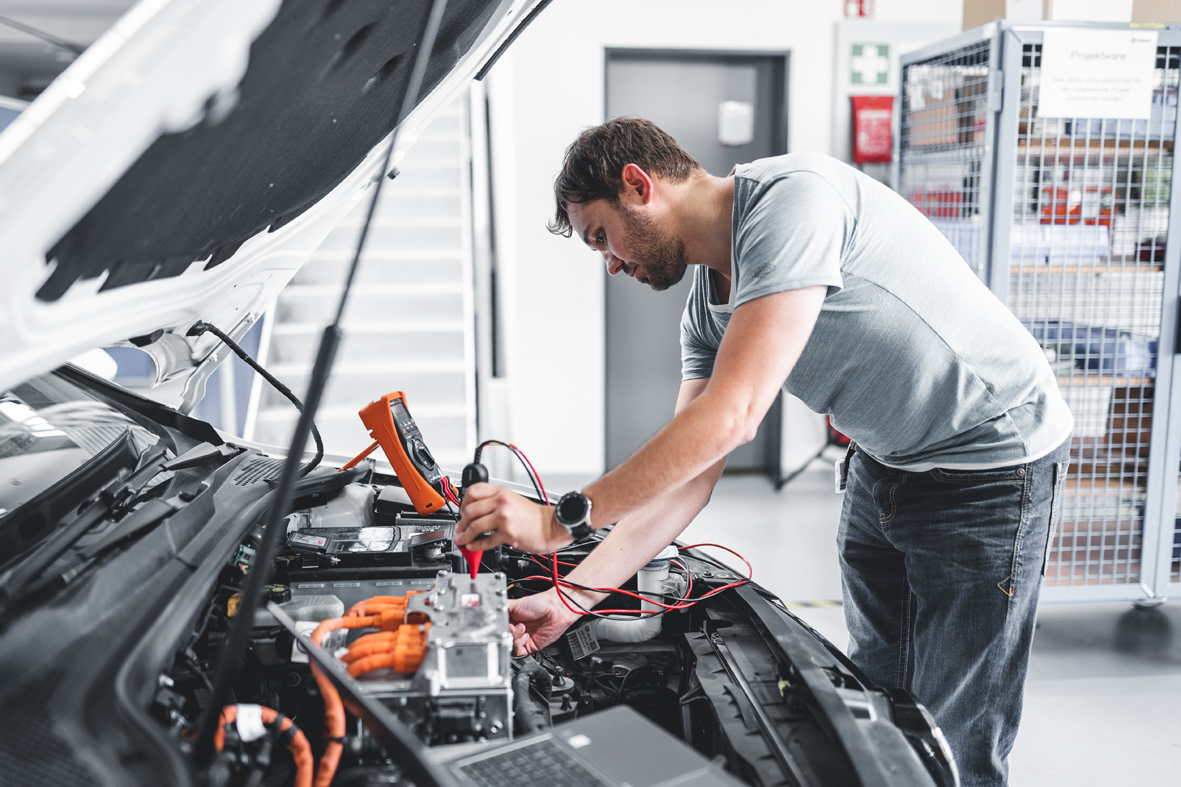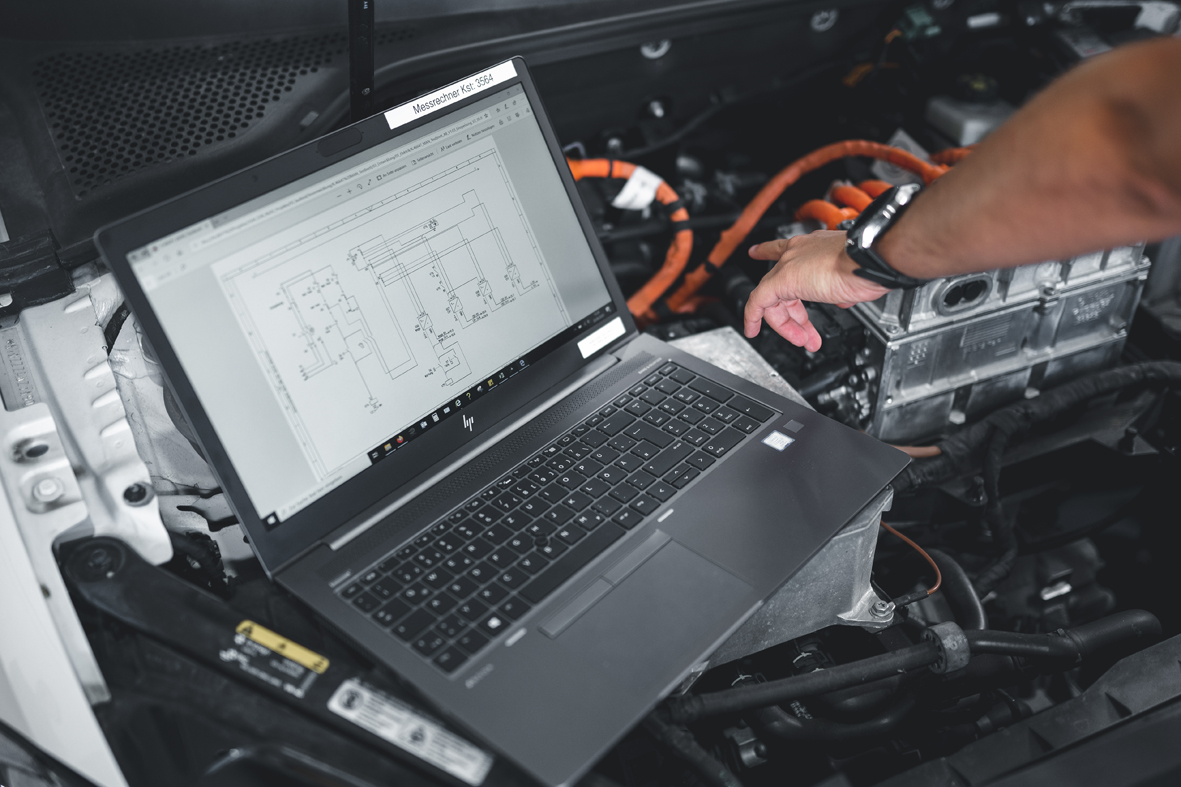

As the automotive industry continuously transitions to electric vehicles, workplace safety and health risks are shifting.
Here at EDAG, our automotive industry knowledge and high regard for implementing and following safety standards have culminated to create training courses for all possible levels required for the high voltage systems integrated into vehicles.
Our high voltage safety training offers a comprehensive and unparalleled learning experience by incorporating hands-on demonstrations and practical scenarios that are not offered elsewhere. We provide participants with a training environment that is vital to allowing them to apply their new knowledge and gain confidence in handling high voltage equipment under real-world conditions.
EDAG offers High Voltage Safety Training courses ranging from 0E (HV Sensitized Person) to 3E (HV Qualified Person - Working Under Live Conditions). EDAG's high voltage safety training program offers an on-site in-person hands-on practical on a real HV system within a vehicle at the customer’s location for both 2E and 3E training levels; this portion is not offered anywhere else.
With EDAG’s DGUV, OSHA, and NFPA 70E compliant high voltage training, your organization will gain the necessary expertise and confidence to be properly aware of and handle high voltage equipment safely and effectively, reducing potential hazards and protecting valuable assets. These unique factors make EDAG's High Voltage Safety Training courses the ideal option to train employees with.
EDAG's HVST goes beyond basic safety protocols and delves into:
All Training Levels:
risks and risk assessment
specific procedures and methods
becoming familiarized with HV concepts

Only Training Levels 2E and 3E:
electrical physics and theories
dry run practices (voltage measurement of critical components of the HV system)
becoming familiarized with HV components (ex. service disconnect, switches, connectors, etc.)
decommissioning/commissioning an electric vehicle (EV)
These advanced skills are essential for individuals who work with high voltage systems and vehicles, ensuring proper safety procedures and a safe work environment.
A brief high-level description of each high voltage training level that we offer is provided below.
Any questions or interest can be directed to emma.von.holtz(at)edag.com. Additional training information and quotes can be provided upon request as well. Please provide your email, full name, company, and position when reaching out.
Training Level | 0E HV-Sensitive Person | 1E Skilled Person Instructed | 2E High Voltage Qualified Person (FHV) | 3E FHV - Working Under Voltage |
OHSA Training Qualifications | - Know to avoid exposure to anything over 50 volts | - Trained to avoid electrical hazards of working on or near exposed energized parts | - Trained to avoid electrical hazards of working on or near exposed energized parts | - Trained to avoid electrical hazards of working on or near exposed energized parts |
NFPA 70E Training Qualifications | - Know to avoid exposure to anything over 50 volts | - Have skills and knowledge related to the construction and operation of the electrical equipment and installations and has received safety training to recognize and avoid hazards involved | - Have skills and knowledge related to the construction and operation of the electrical equipment and installations and has received safety training to recognize and avoid hazards involved | - Have skills and knowledge related to the construction and operation of the electrical equipment and installations and has received safety training to recognize and avoid hazards involved |
DGUV Training Qualifications | - Not certified to work whatsoever on high voltage vehicles
- Only certified for proper usage of the vehicle (driving, very basic maintenance such as windshield wiper fluid, windshield wipers, headlights and taillights, etc.) | - Not certified to work whatsoever on high voltage components
- Only certified for mechanical and electrical work on everything but the high voltage system permitted | - Certified to work on high voltage components that are voltage free
- Certified to decommission and re-commission the high voltage system; certified to do work on a decommissioned high voltage system | - Certified to work on high voltage components that are under live conditions |
EDAG HVST Program
*Meets OSHA, DGUV, and NFPA 70E Qualifications | - Minimum number of attendees: 1+
- Can be taught online or in-person
- Know to avoid exposure to anything over 50 volts
- Only certified for proper usage of the vehicle (driving, very basic maintenance such as windshield wiper fluid, windshield wipers, headlights and taillights, etc.) | - Minimum number of attendees: 1+
- Can be taught online or in-person
- Only certified for mechanical and electrical work on everything but the high voltage system permitted
- Not certified to work whatsoever on high voltage components
- Trained to avoid electrical hazards of working on or near exposed energized parts
- Have skills and knowledge related to the construction and operation of the electrical equipment and installations and has received safety training to recognize and avoid hazards involved | - Minimum number of attendees: 4+
- Only taught in-person
- Certified to work on high voltage components that are voltage free
- Certified to decommission and re-commission the high voltage system; certified to do work on a decommissioned high voltage system
- Trained to avoid electrical hazards of working on or near exposed energized parts
- Have skills and knowledge related to the construction and operation of the electrical equipment and installations and has received safety training to recognize and avoid hazards involved | - Minimum number of attendees: 4+
- Only taught in-person
- Certified to work on high voltage components that are under live conditions
- Trained to avoid electrical hazards of working on or near exposed energized parts
- Have skills and knowledge related to the construction and operation of the electrical equipment and installations and has received safety training to recognize and avoid hazards involved |
See our international website for more information.